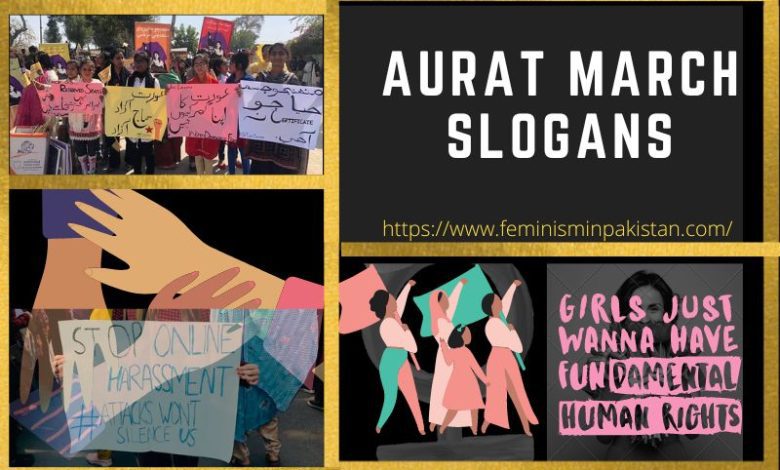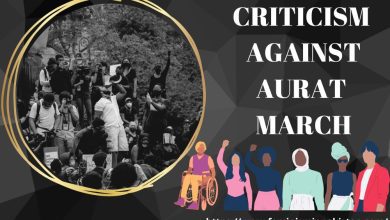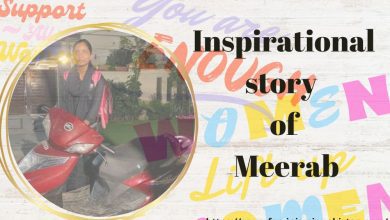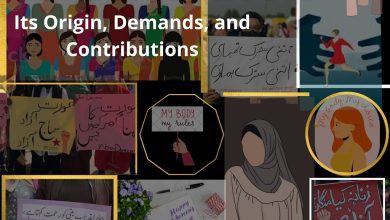Criticism Against Aurat March Slogans

MERA JISM MERI MARZI (My Body, My Choice)
The Theme Behind The Slogan

|
| Aurat March Slogans |
Mera Jism Meri Marzi (My Body, My Choice) is one of the most
controversial slogans used by Pakistani feminists in Aurat March in 2018,
and words of this nature cause outrage among Pakistanis. Many Pakistanis
harshly criticized the Aurat March and claimed it was against religious
and cultural norms. Critics blame Pakistani feminists for the current
state of social disarray and cultural anarchy, promoting obscenity and
sexuality in society and hurting social, cultural, and pious
values.
However, Pakistani feminists and experts denied it and argued that Aurat
March slogans like Mera Jism Meri Marzi (My Body, My Choice) have a poor
understanding of feminism and its slogans. Pakistan’s Aurat March
participants claimed that critics are trying to portray these slogans as
western agendas, but in reality, such slogans differ in their objectives
from those of the West. According to them, slogans like “Mera Jism Meri
Marzi” (My Body, My Choice), “Mera Wajood Meri Marzi” (My Existence, My
Choice), and “Meri Zindagi Mere Faslay” ( My Life, My Decisions) are
metaphorical and should be interpreted broadly.
Violence, Injustice, and Inequalities against Women
In Pakistan, feminists believe that “Mera Jism, Meri Marzi” is important
because women are subject to structural violence, injustices, and
inequality. These slogans denounce rapes, forced marriages, child
marriages, acid attacks, violence, physical and mental abuse, harassment
in public and private spaces, female genital mutilations, acid assaults,
inequalities, injustices, and honor killings.
According to the
Journal of the Pakistan Medical Association, approximately 70 to 90% of women are subject to domestic violence in Pakistan. In
the same way, thousands of women are raped, harassed, abused, and killed
in the name of honor each year, and most cases remain unregistered in
police stations.
Participants of the Aurat March used Mera Jism Meri Marzi for women’s
empowerment and for their fundamental rights. These slogans do not mean
women want to promote western culture or agenda, dress inappropriately, or
have extramarital affairs. These slogans mean having bodily autonomy and
fundamental and equal women’s rights.
Bodily Autonomy
Here, bodily autonomy means no one has the right to stare, touch, or
commit sexual assault on women without the women’s consent in private or
public places. Physical and sexual assaults and forced marriages are
widespread in all classes of Pakistan. The handling of assaults on women
is considered a personal matter; they go unseen until they manifest in
extreme forms, such as murder or attempted murder. Furthermore, martial
rapes are rejected as crimes in Pakistan because these laws negate women’s
rights to control over their own sexuality.
Women cannot be empowered and grow until and unless they have no bodily
autonomy and access to reproductive rights and have no right to make
family planning decisions. As it is said that men shape the reproduction
decision, and until and unless men are not proactively involved in
reproduction decisions or family planning, women cannot decide about it.
It means women have no reproductive rights, and due to improper
treatments, malnutrition, and multiple deliveries, women face severe
health issues.
So, My Body is My Right, and the denial of bodily autonomy means the
negation of the fundamental rights of women.



